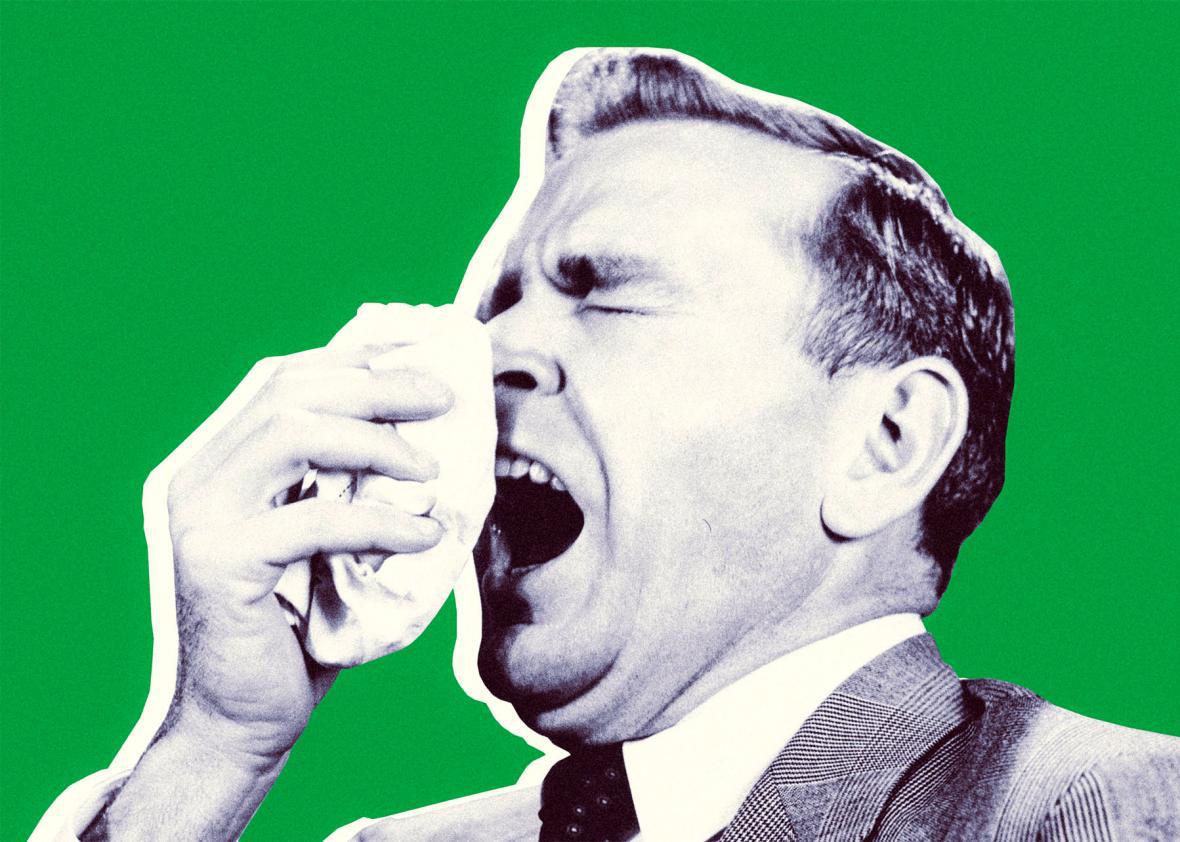The notion of a “man flu” has long circulated on the internet, a silly concept with some serious staying power. While it’s been entered into more reputable lexical receptacles since, Urban Dictionary defined it first and best: “The condition shared by all males wherein a common illness (usually a mild cold) is presented by the patient as life-threatening. This is also known as ‘Fishing for Sympathy’ or ‘Chronic Exaggeration’. When the patient is your boyfriend, he will exhibit the standard symptoms (such as an overwhelming desire for compassion) while simultaneously rejecting any and all efforts you make to placate him.”
Part joke, part lived experience, the man flu has now reportedly been validated by science, sort of. On Monday, the British Medical Journal published its special Christmas edition. An annual installment of slightly-more-fun-than-usual scientific research, 2017’s issue included a literature review arguing for the empirical validity of the concept of man flu. Written by Canadian researcher and family medicine doctor Kyle Sue, the tongue-in-cheek journal article “explores whether men are wimps or just immunologically inferior.” According to Sue, who writes that the article came about because he was “tired of being accused of over-reacting,” mocking man flu isn’t just mean, but “potentially unjust”:
Men may not be exaggerating symptoms but have weaker immune responses to viral respiratory viruses, leading to greater morbidity and mortality than seen in women. […] Lying on the couch, not getting out of bed, or receiving assistance with activities of daily living could also be evolutionarily behaviours that protect against predators.
In his article, Sue looks at a handful of previous studies to support his man flu thesis. He notes that men appear, at least according to some research, to be less responsive to the flu vaccine, which could increase the chance they get the flu in the first place. Later, he documents how males are more likely to experience complications or even die from acute respiratory problems such as bronchitis or pneumonia.
While the studies Sue cites are certainly reputable, that doesn’t actually mean the man flu as it’s commonly understood is real. And it’s certainly not a validation to men who misbehave when they’re ill. Sabra Klein of Johns Hopkins University Bloomberg School of Public Health and several other experts have criticized the conclusions of Sue’s research. Klein told CNN that there could be a “man flu,” but only if you look at certain subpopulations: Before puberty and in old age (65 years and over), it really does seem more likely that men get hospitalized for the flu. But in middle age, there’s a slight uptick in the number of women—in particular, pregnant women in the midst of a nine-month immunosuppression stint—that go to the emergency room for influenza side effects. In other words, there may be some semblance of boy flu and an old man flu, but all things being equal, influenza isn’t a particularly sexist infection.
The evidence Sue gathered seems to substantiate the idea that men are biologically weaker in several key (and potentially fatal) ways. This is something experts have long understood to be true, as men the world over are more likely to die than women at every point along the lifespan, from the womb to old age. But it’s a reality that’s remained difficult to explain scientifically. For many years, scientists have been exploring whether sex hormones are to blame. In an article for Slate about the prevalence of women with autoimmune disorders (a sign of an overactive immune system) Jeremy Singer-Vine wrote that, “Testosterone tends to suppress the body’s response to infection, while estrogens typically boost it. Since women have a more vigorous response, goes the argument, their immune systems might be more likely to become hyperactive.”* According to that line of thinking, men would then have a lethargic immune system that would keep them from developing autoimmune diseases en masse, but also from fighting off infection. But, Singer-Vine continues, “Data to support these claims, however, have been inconclusive.”
Another theory for the sex disparity, Singer-Vine writes, is that women’s double X chromosome give them a genetic boost, while men’s already miniature Y chromosome is literally shrinking even further. It’s also possible that the sex disparity in people’s influenza response is partially a social phenomenon. It’s been widely documented that men are less likely to see a doctor than women, which might mean they’re less likely to get the flu vaccine in the first place, or to go to the doctor on the rare chance their flu symptoms escalate. While there are numerous factors that influence a visit to the doctor’s office (insurance, income, and access being chief are among them), there’s reason to believe masculinity could be partially to blame. Research indicates that men routinely cite embarrassment, a desire to maintain their privacy, anxiety, and flawed communication as reasons for not seeing a doctor. Unlike the physical theories, this social hypothesis could support Sue’s claims—but not in the way he’d probably hope.
Writing in the British Medical Journal, Sue cites a finding that women were more likely to take time off when they experienced just one flu symptom. “This contradicts the common myth that men cut down activities more than women by exaggerating the severity of symptoms,” he writes. What Sue fails to note is that taking time off when the first symptoms of a cold strike—and not working through until you’re so physically exhausted you’re forced into the fetal position and need others to do your bidding—is clearly the healthier choice.
*Correction, Dec. 12, 2017: This article originally misidentified the author of an article about autoimmune disorders. It was Jeremy Singer-Vine, not Jeremy Samuel Faust. (Return.)
